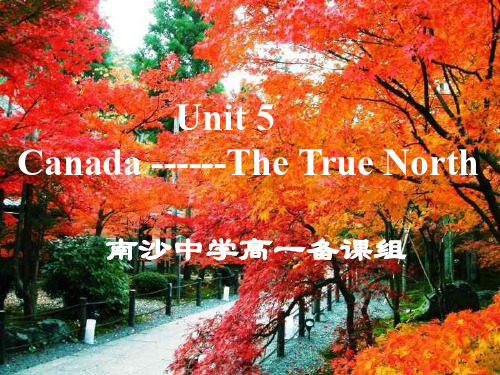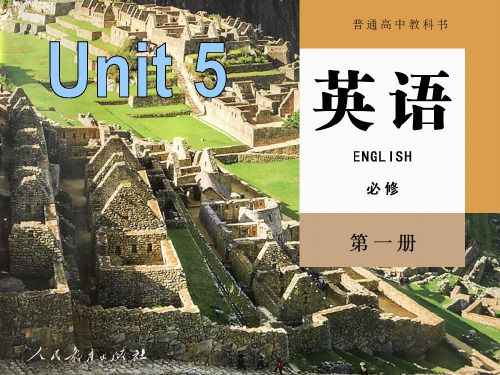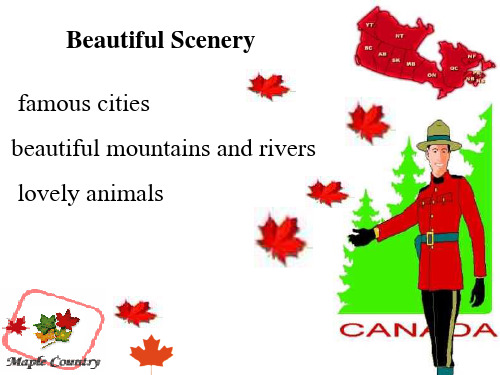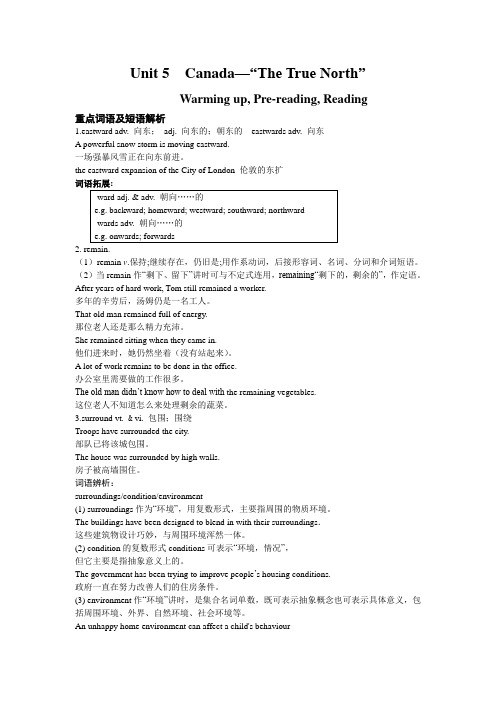高一英语unit-5-canada-listening
- 格式:ppt
- 大小:438.50 KB
- 文档页数:30


Section Ⅰ Warming Up & Reading—Comprehending[学生用书P133(单独成册)]Ⅰ阅读理解AIt was a cold morning, and Eduardo Ortega was nervous. Heheld a large envelope. In it was his dream.“This is everything,”he said. “I’ve worked for thissince I was a young boy.”Eduardo remembered the long hours working in the fields,picking strawberries and beans. After the workday, his tired friends drank coffee or slept. Eduardo studied, read, and wrote poetry and short stories. Although he missed many classes, he became the school’s best student.One school year, Eduardo wrote an essay(文章) and won a prize—a flying trip to San Francisco. As he flew, he felt free from his life of hard work in the fields. He promised himself not to return to that life. He loved to fly.This morning, Eduardo caught the school bus and went to school with the envelope. He walked past his classmates and sat down at his desk. He opened the envelope and began reading the letter inside. It was the answer to his application to the state university. It was also the answer to the beginning of his dream of becoming a pilot.Even though Eduardo worked to help his family, his father always encouraged him to go to school. So, while he worked, he also studied.Eduardo knew that his dream was his father’s dream, too. His father was a smart man, but he was too poor to go to college. He loved to read, but never had time, because he worked long hours.Now, as Eduardo read the words,“Congratulations ... you have been accepted,”he knew that his dream was not lost. One day, he would be a pilot, flying every day to all the exciting places in the world.【解题导语】本文是一篇记叙文。




Unit 5 Canada—“The True North”Warming up, Pre-reading, Reading重点词语及短语解析1.eastward adv. 向东;adj. 向东的;朝东的eastwards adv. 向东A powerful snow storm is moving eastward.一场强暴风雪正在向东前进。
the eastward expansion of the City of London 伦敦的东扩-ward adj. & adv. 朝向……的e.g. backward; homeward; westward; southward; northward-wards adv. 朝向……的e.g. onwards; forwards(1)remain v.保持;继续存在,仍旧是;用作系动词,后接形容词、名词、分词和介词短语。
(2)当remain作“剩下、留下”讲时可与不定式连用,remaining“剩下的,剩余的”,作定语。
After years of hard work, Tom still remained a worker.多年的辛劳后,汤姆仍是一名工人。
That old man remained full of energy.那位老人还是那么精力充沛。
She remained sitting when they came in.他们进来时,她仍然坐着(没有站起来)。
A lot of work remains to be done in the office.办公室里需要做的工作很多。
The old man didn’t know how to deal with the remaining vegetables.这位老人不知道怎么来处理剩余的蔬菜。
3.surround vt. & vi. 包围;围绕Troops have surrounded the city.部队已将该城包围。
高一英语Unit 5 Canada—“The True North” (第九周)集体备课教案备课人:曹淑琴王元录The fourth period Learning about languageKnowledge&ability goals :Get students to learn some basic knowledge about word formationEnable students to make sentences after the useful sentence patterns.Process&methods:practice ,expansion,dictationEmotional aimsStimulate students’interests in learning more knowledge about word formation.Key & difficult points:Different meanings of prefix and suffix of word formation in English.Step 1: Revision1.Check the homework exercises.2.Ask some students to dictate some useful new words and expressions.Step 2V ocabulary study1.Let students review the new words and expressions in Warming Up,Pre-reading,Reading and Comprehending and give them to students to ask their own questions.2 Ask students to learn some new words using the word formation.3 Explain some key new words and expressions.Step 3 Practice for useful words and expressionsLet students do the following exercises and check the answers after most of them finish.Find words that mean the same to fill in the blanks.1) bags that people take with them when they travel.2) a government member who is in charge of a government departmemt3) a short informal test4) to take to someone in a friendly ,informal way5) on or onto a ship ,plane,bus,or train6) general appearance of nature around you,especially beautiful nature7) in or by a very small amount,so small that it almost cannot be seen8) to be all around somebody or something on every side2.Guess the meanings of the words below according to the word formation.rather than settle down manage to do catch sight of have a gift forStep 4 Sentence focusAsk students to read through the Warming Up and Reading again to find out the difficult sentences they can’t understand and give time to students to ask their own questions.Explain them to the class.Step 5 Workbook exercises for consolidationAsk students to do the exercises in Using Words and Expressions on Pages 70-71 to consolidate what they have learned in this period.Step 6 Homework1.Learn the new words and expressions by heart.2.Finish off the Workbook exercises.3.Do Exercise 3 on Pages70-71 in the exercise book.The fifth period (Grammar)Knowledge&ability goals :Get students to know more about noun clauses.Enable students to use noun clauses as the appositive correctly and properly according to the context. Process&methods:Practice,explanation,summaryEmotional aims:1.Get students to become interested in grammar learning.2.Develop students’ sense of group cooperation.Key & difficult points:Get students to understand and use noun clauses as the appositive.Enable students to learn how to use noun clauses as the appositive correctly.Step1 RevisionT. What kind of noun clauses are they?1. What it was to become was a mystery.(主语从句)2. I don’t know who will help Henry to win the bet.(宾语从句)3. His trouble is that he doesn’t know anybody in London.(表语从句)4. The fact that ships can go there surprises many people.(同位语从句)Step 2 Grammar points同位语从句讲义及练习一、理解同位语从句的含义,把握同位语从句的实质在主从复合句中作同位语的从句称为同位语从句。